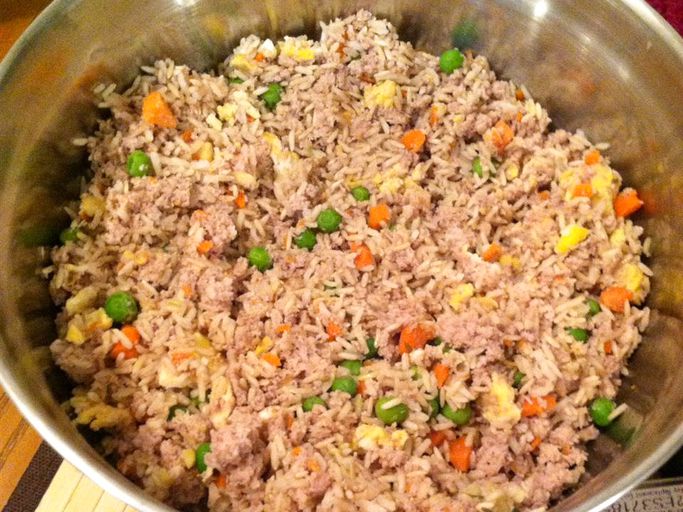Table of Contents
Dogs with sensitive stomachs require special care when it comes to their diet. Store-bought food often contains fillers, additives, or allergens that can trigger digestive issues.
Crafting homemade dog food for sensitive stomachs is a great way to provide fresh, nutritious, and easily digestible meals that help your dog feel their best. In this guide, we’ll explore the causes of sensitive stomachs in dogs, essential ingredients, and recipes to soothe their digestive systems.
Why Do Dogs Have Sensitive Stomachs?
Dogs may develop sensitive stomachs for various reasons, including:
- Food Allergies: Some dogs are allergic to common ingredients like chicken, beef, grains, or dairy.
- Intolerances: Certain dogs struggle to digest specific ingredients, such as lactose or gluten.
- Underlying Medical Conditions: Issues like inflammatory bowel disease (IBD) or pancreatitis may cause chronic stomach sensitivity.
- Dietary Changes: Switching dog foods abruptly can upset your pet’s digestion.
Understanding the root cause of your dog’s stomach problems is crucial. A visit to the vet can help rule out underlying health conditions.
Benefits of Homemade Dog Food for Sensitive Stomachs
Making your dog’s food at home has several advantages, particularly for pups with digestive sensitivities:
- Customized Diet
You can avoid specific allergens or irritants and tailor recipes to your dog’s unique needs. - Natural and Fresh Ingredients
Homemade meals eliminate preservatives, artificial flavors, and fillers that may worsen stomach problems. - Improved Digestion
Fresh, easily digestible ingredients can help reduce symptoms like bloating, gas, and diarrhea. - Increased Energy and Health
Proper nutrition supports a healthy immune system and overall vitality.
Key Ingredients for Dogs with Sensitive Stomachs
Choosing the right ingredients is vital for preparing balanced and gentle meals. Here’s what to include:
Proteins
- Lean meats like turkey or chicken (if not allergic).
- Fish such as salmon or whitefish for a rich source of omega-3 fatty acids.
- Eggs, which are gentle on the stomach and packed with protein.
Carbohydrates
- Rice (White or Brown): A staple for sensitive stomachs, providing energy without causing irritation.
- Sweet Potatoes: Rich in fiber and nutrients, great for digestion.
Fruits and Vegetables
- Pumpkin: Helps regulate digestion and ease diarrhea or constipation.
- Carrots and Green Beans: Low in calories and easy on the stomach.
- Zucchini: A mild, easily digestible vegetable.
Healthy Fats
- Fish oil or coconut oil for healthy skin, coat, and digestion.
Foods to Avoid for Sensitive Stomachs
To prevent further irritation, steer clear of:
- Dairy Products: Many dogs are lactose intolerant.
- High-Fat Meats: These can cause bloating or pancreatitis.
- Spices and Seasonings: Garlic, onions, and salt are toxic to dogs.
- Corn, Soy, and Wheat: Common allergens in commercial dog food.
- Raw Food: Cook all ingredients to reduce the risk of bacterial infections.
Simple Homemade Recipes for Sensitive Stomachs
1. Turkey and Rice Meal
A classic combination that’s easy to digest and gentle on the stomach.
Ingredients:
- 1 pound of lean ground turkey
- 1 cup of cooked white rice
- ½ cup of steamed carrots and zucchini
Instructions:
- Cook the ground turkey until fully browned.
- Steam the carrots and zucchini until soft.
- Mix the turkey, rice, and vegetables thoroughly.
- Let the meal cool before serving.
2. Salmon and Sweet Potato Bowl
Packed with omega-3s and fiber, this recipe supports digestion and skin health.
Ingredients:
- 1 cup of cooked salmon (bones removed)
- 1 cup of mashed sweet potatoes
- ¼ cup of steamed green beans
Instructions:
- Bake or grill the salmon until fully cooked.
- Mash the sweet potatoes and steam the green beans.
- Combine all ingredients and mix well.
- Serve fresh or store in the refrigerator for up to three days.
3. Chicken and Pumpkin Delight
This meal is great for dogs with diarrhea or constipation, thanks to pumpkin’s digestive benefits.
Ingredients:
- 1 cup of boiled chicken (shredded)
- ½ cup of cooked white rice
- ¼ cup of canned, unsweetened pumpkin
Instructions:
- Boil the chicken and shred it into small pieces.
- Mix in the cooked rice and pumpkin.
- Let it cool before serving.
Tips for Preparing Homemade Food for Dogs
- Transition Gradually
Slowly introduce homemade food to your dog’s diet to avoid further stomach upset. - Portion Control
Feed your dog the appropriate amount based on their size and activity level. - Avoid Overfeeding
Smaller, more frequent meals can help with digestion. - Consult Your Vet
Work with a veterinarian or pet nutritionist to ensure your recipes are balanced and meet your dog’s dietary needs.
FAQs About Homemade Dog Food for Sensitive Stomachs
1. How do I know if my dog has a sensitive stomach?
Common signs include vomiting, diarrhea, excessive gas, or a loss of appetite.
2. Is chicken good for dogs with sensitive stomachs?
Chicken is generally safe unless your dog is allergic to it. Boiled chicken is especially gentle on the stomach.
3. Can I feed my dog homemade food every day?
Yes, as long as the meals are nutritionally balanced. Consult a vet to ensure your recipes meet your dog’s needs.
4. What are some protein alternatives for sensitive dogs?
Turkey, fish, and eggs are excellent alternatives if chicken causes issues.
5. Can I add supplements to homemade dog food?
Yes, adding probiotics, fish oil, or multivitamins can support overall health, but consult your vet first.
6. How do I store homemade dog food?
Store food in airtight containers in the refrigerator for up to three days or freeze for longer storage.
Conclusion
Preparing homemade dog food for sensitive stomachs is a thoughtful and effective way to improve your dog’s digestion and overall well-being. By using fresh, simple ingredients and avoiding common allergens, you can create meals that keep your furry friend happy and healthy.
Always consult your vet before making significant changes to your dog’s diet to ensure it’s balanced and meets their unique needs.







